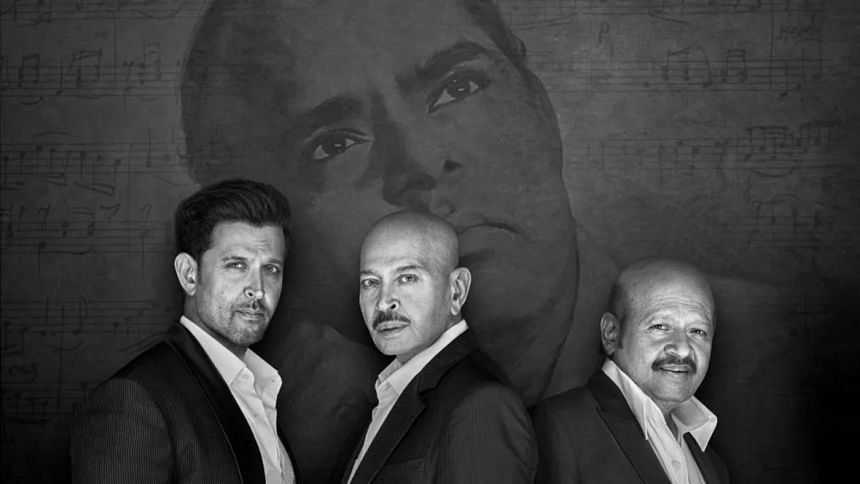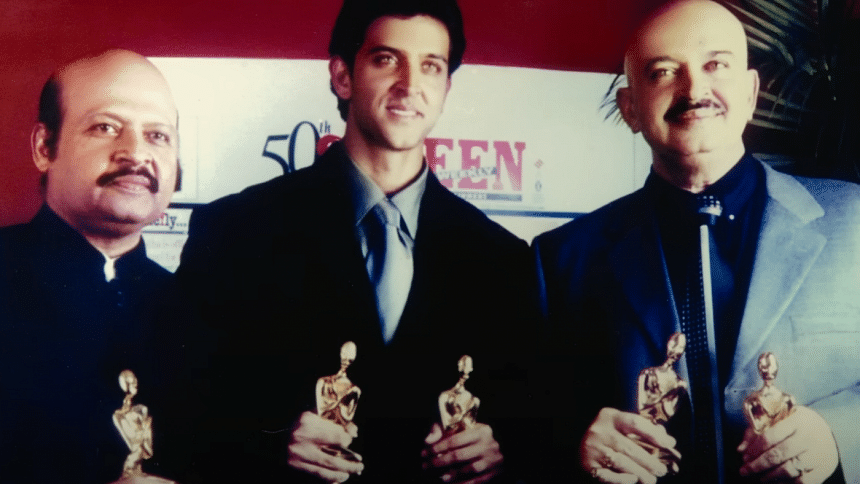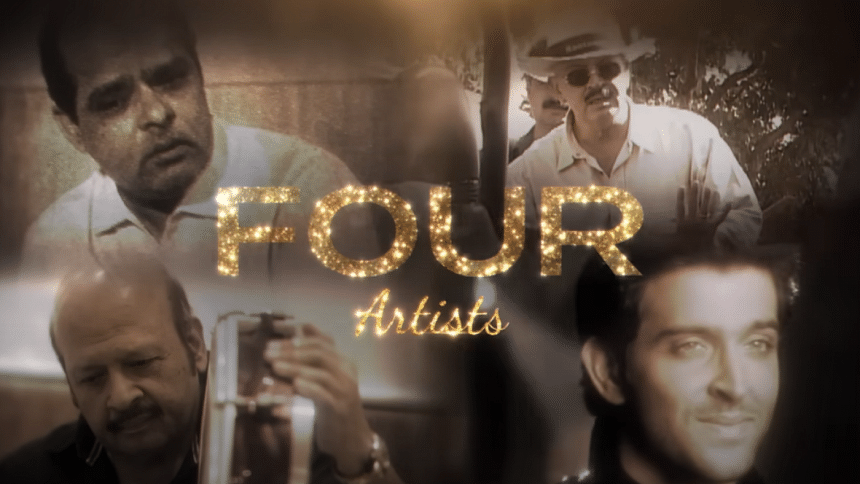Playing it safe: ‘The Roshans’ compromises its own potential

The Roshan family has been active in the Hindi film industry for multiple generations, contributing to music, acting, and direction for over 60 years or so. Naturally, there was a story waiting to be told. Their dynasty includes the patriarch and music maestro Roshan Lal Nagrath, his sons Rajesh Roshan, the music composer, and Rakesh Roshan, the director, and actor, as well as his grandson Hrithik Roshan, who became an overnight sensation with his first leading role in "Kaho Naa… Pyar Hai" (2000) and is one of Bollywood's most beloved stars today.
Directed by Shashi Ranjan, Netflix's four-part documentary, "The Roshans", opens on a nostalgic note. We see Hrithik Roshan listening to a recently rediscovered old composition by his grandfather. We are eavesdropping on a very personal moment that ends with him saying, "It's a very interesting story how our surname went from Nagrath to Roshan." Except we don't actually get that story.
"The Roshans" quickly begins to present cameo after cameo. Veteran film critic and filmmaker Khalid Mohammed appears, offering general comments about how talented this family is, but we don't hear him talk about writing and directing "Fiza" (2000). Sanjay Leela Bhansali provides no deeper insights into "Guzaarish" (2010); and Karan Johar does not delve into the making of "Kabhi Khushi Kabhie Gham…" (2001).

We hear Hrithik Roshan's co-stars, including Ameesha Patel, Preity G Zinta, and Priyanka Chopra Jonas, talk about how enjoyable it is to work with the Roshans, how lovely the environment is, and how they all knew that Hrithik Roshan was born to be a star. However, none of this admiration or sentiment is new; we have heard it countless times before.
To its credit, "The Roshans" kicks off the proceedings with its best tale, which is of the late Roshan Lal Nagrath, fondly known as Roshan. Born in Punjab in pre-Independent India and far removed from the world of music and entertainment, Roshan forged a way for himself by pursuing classical music with a lot of purity in his heart. Bombay would beckon to him just as it did to every artiste in search of work and recognition back in the day, and he would slowly but surely make a mark in the burgeoning Hindi film industry with his touch of originality.
Roshan's music is illuminated by songs like "Nigahein Milane Ko Jee Chahta Hai", "Laga Chunari Mein Daag", and "Jo Wada Kiya Woh Nibhana Padega", among many others. The first episode contains the gems that Bollywood history buffs crave, but "The Roshans" only offers a mild exploration of them.
With that said, the intrigue does continue to simmer when we get to learn more about Rajesh Roshan and his work. It is fascinating to think that the composer with songs like "Saj Rahi Gali Meri Maa", "Pardesiya Yeh Sach Hai Piya", and a Filmfare Award for "Julie" (1975) under his belt also evolved so rapidly to create "Ek Pal Ka Jeena" for his nephew's grand launch. So many iconic songs came from this unassuming man who is seldom celebrated the way he deserves.

His wife, Kanchan Roshan, begins to talk about their lives behind the scenes and how difficult it probably was to be married into this family. However, the focus quickly shifts just as the conversation starts to get interesting. This is a recurring issue with the series, produced by the Roshans themselves. The final edit, presented to us allows for little engagement, conflict, or critique. Halfway through, we realise that "The Roshans" is content to remain a polite, celebratory portrait.
I was seeking insights into the emotional and intellectual costs of sustaining a multigenerational dynasty, but there wasn't much to be found. For instance, "The Roshans" references a dramatic event in Rakesh Roshan's life when he was shot. For those in the know, the attempted assassination in 2000 was a major news story; he was reportedly targeted by the Mumbai underworld. Yet, the series mentions it only glancingly, never exploring how that incident shaped him, impacted the family, or who shot at him and why.
It should have been a pivotal moment, highlighting the underbelly of the Hindi film industry at that time, as well as the Roshan family's resilience and the industry's transition away from a phase in which multiple actors and filmmakers had spoken about being targeted.
Instead, "The Roshans" prioritises very safe retrospectives over insights. For a series that claims to provide an inside look into a legendary film family, the absence of elaboration or novelty leaves a significant gap where narrative drama could be. Some oddly cheesy and dramatic reenactments further detract from the viewing experience.

The final episode shines a light on Hrithik Roshan's meteoric rise, but it focuses more on his father than on him. It never fully commits to unveiling the complexities behind his stardom; his struggles with health issues and intense training are already well-documented stories.
For many years, this family was connected by marriage to another Bollywood dynasty—the Khans—a fact that is never mentioned. Frankly, old episodes of "Rendezvous with Simi Garewal" offer more insights.
As the final episode wraps up, we see Hrithik Roshan's young sons playing "Wonderwall" on their guitars, providing a sentimental nod to the music that fuels this household. It is a sweet touch, but like the song the kids are playing, the effect feels overly familiar. Ultimately, "The Roshans" is a tribute that breezes past anything that is weighty — it deserved a more daring and revealing narrative.

 For all latest news, follow The Daily Star's Google News channel.
For all latest news, follow The Daily Star's Google News channel. 









Comments